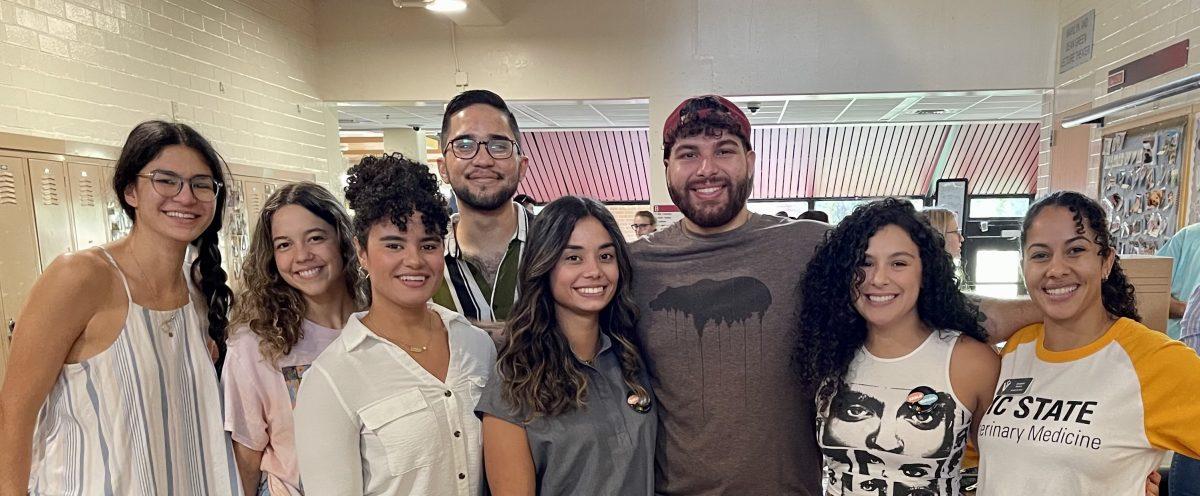Latinx Veterinary Medical Association (LVMA) brings students together to create an inclusive community within the NC State College of Veterinary Medicine (CVM) and the world of veterinary medicine as a whole.
LVMA was created to increase visibility of Latinx veterinarians and to inspire current and future vet students. LVMA holds chapters at universities across the nation, including Texas A&M and University of Pennsylvania. Natalia Rosa Padilla, graduate student in veterinary medicine and president of LVMA, and Raisa Velez Contreras, graduate student in veterinary medicine and vice president of LVMA, are two of the founders of the LVMA chapter at NC State.
“What LVMA strives to do is highlight the importance of diversity, especially Latinx communities within Vet Med,” Velez Contreras said. “It’s really important that we create a safe space for us to have an outlet, have tools and just for mental health in general. So that’s what we wanted to do. We wanted to have an outreach program for Latinx veterinary students, professionals, but also be able to cater to the needs of people who don’t necessarily identify themselves as being part of the Latinx community, but want to serve as advocates or just show support.”
Rosa Padilla said LVMA gives resources and provides community for those in the Latinx community and teaches allies how they can offer support to their peers and co-workers.
“The goal of this club, as [Velez Contreras] said, it’s not only to welcome our Latinx community, but also all the people that want to be an ally,” Rose Padilla said. “And for those that are Latinx, we want to give them the tools to feel comfortable, happy and be successful in their career. For those that are allies, we just want to let them know how we feel, what we need for them to support us and kind of be vulnerable.’”
Rosa Padilla said LVMA allows Latinx students to celebrate their own culture despite being surrounded by American culture.
“We want to give them a safe space to be themselves,” Rosa Padilla said. “So at our meetings, you can talk your own language, which is mostly Spanish, and you can also embrace your culture, embrace your heritage without any hesitation. You don’t have to hide that. For people that move from different countries, [it] is really hard to get used to all the culture here. Even though United States is very diverse, it’s mostly American. So I don’t have my food, I don’t have my language and I don’t have things like dancing or going out. It’s really hard to lose that. So the point is that we at LVMA are bringing that to the campus. Let’s bring some of our food, let’s show people how we eat, let’s give them classes of Spanish, let’s talk about how to become an ally to our community.”
Sonyaliz Goveo, graduate student in veterinary medicine and social media chair of LVMA, said LVMA also works with other organizations in CVM to continue spreading awareness and inclusivity.
“The way that we’re [focusing on the Latinx community] is we’re being very inclusive with the CVM community,” Goveo said. “So we’re always reaching out to other organizations, whether those are within the minorities, or if they’re not. We’re always trying to collaborate and making sure that we are creating those relationships, building trust within other communities and organizations that are on campus, and developing that inclusivity and that welcoming environment.”
Rosa Padilla said a big goal of LVMA is to ease the imposter syndrome aspiring Latinx veterinarians tend to experience.
“Something… that happens a lot with minority communities is imposter syndrome,” Rosa Padilla said. “We, as Latinx students, heard a lot during undergrad, ‘You’re not going to make it.’ I was born and raised in Puerto Rico. So like, I can’t count with my two hands how many times I heard, ‘You’re not going to vet school. That’s really hard. You’re moving to the United States. That’s really hard. How can you change your culture?’ It’s really nice to have that moment, that hour, to let [students] know, ‘Hey, we’re here for you, you can do it because we did it, and these are all the things that you need to make it happen, including your passion.’”
Velez Contreras said she thinks having people around that have actually gone through what you are going through is really important when going through these big transitions of moving to a new country, going through undergraduate school and then a doctorate program.
“Having people who understand and can empathize with your situation is really important when transitioning from an undergraduate [to a] doctorates degree program,” Velez Contreras said. “And just bolstering the importance of diversity within veterinary medicine, just knowing that you have people you can rely on makes this journey so much more easy.”
To get involved with LVMA, follow them on Instagram and Facebook or email them at latinxvma20@ncsu.edu.













